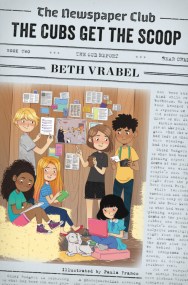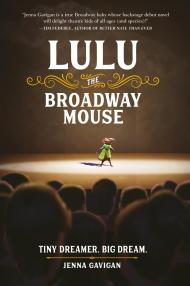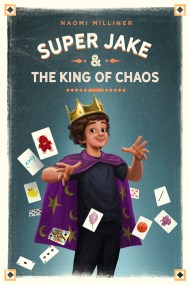Chapter One
I stood in the middle of the newsroom, trying to ignore the fact that it was actually my neighbor Thom’s barn.
“Listen, everyone! Let’s hash out the first issue,” I said.
Thom smiled at me. I did not smile back. I needed to look serious. At least I had sounded serious. I had practiced calling the meeting to order in front of the bathroom mirror all morning. The trick was to square up your face so your eyes felt like pried-open windows. Next, you had to make your voice a rumble like it started down in your toes and was being forced out of the grout stopping up your mouth.
“What’s wrong with your voice?” asked my other neighbor, Min Kim–Franklin. She didn’t look up from where she was adding her name to the sign-in sheet by the open barn doors.
“Nothing,” I said. I looked down at her name and shuddered. I didn’t like a lot about Min Kim–Franklin, but what I liked the least of all was her tendency to sign her name with a heart instead of a dot over the i.
“Something is wrong with your voice, I’m sure of it,” she said. Min’s only a year younger than me but the word baby flashed across my mind every time I saw her. Maybe it was the ruffles. The headband holding back her smooth dark hair had little cream-colored ruffles. They matched the cream-colored dress, also with ruffles, and her orange shorts, which had—you guessed it—ruffles running across the trim. “Are you getting a cold?” she asked.
“No,” I barked.
“There, that’s it again.” Min pointed at me. “Your voice is all gruff and mean sounding. Maybe you should clear your throat.”
“Maybe you should take journalism more seriously,” I snapped.
“That’s better.” She skipped—for real—toward the back of the barn.
Thom and I had put up the fliers in the library, at Wells Diner, and in the park announcing the formation of a newspaper club in Thom’s barn. A part of me hadn’t wanted Min to find out, but of course she had. Min always found out.
No time to think of that now. I had a newspaper to run. I looked across the rest of the sign-in sheet. It’d be a bare-bones staff to start but that was true for most modern newsrooms. (All of these thoughts were in the same grout-mouth voice, which was a lot like my dad’s when he was on super deadline. Or when I was in trouble, like that one time back when we lived in the city and I had placed a very thin coat of flour across the entire kitchen floor. It was to see if we had any tracks after the family in the apartment next to ours lost their pet snake.)
First on the sign-up list should’ve been Thom Hunter, since we were meeting in his barn. Thom lived across the street from me, and both of his parents worked from home so they had super wi-fi connectivity. It stretched right out to the barn. My new house, on the other hand, only got wi-fi in the attic bedroom, where my mom was all of the time writing a novel or turning into a bat, whichever happened first.
Yet Thom hadn’t signed in. I sighed as I watched him wander around the barn. His long floppy blond hair fell nearly across his eyes as he bent over, picked up a greenish strand of hay, and sniffed it. Then he stuffed the hay into a plastic baggie. Also in the baggie was what looked like half of a red crayon, a purple ribbon, a sprig of catnip, and a long, black feather.
I cleared my throat. “Are you ready for me to call the meeting to order?”
“Yeah, Nellie,” he said. Thom’s voice was the opposite of gruff. Instead, it was soft as the cotton ball I also spotted inside the bag. “I’m just adding to my Bag of Smells.”
Thom shook the plastic baggie. I opened my mouth. Closed it. Opened it again. Closed it again. I had a meeting to run. No time to ask why he carried around a bag of smells. Thom could be a little odd, I guess. Not dot-your-i-with-a-heart odd, but odd in different ways. I once saw him follow a butterfly across his yard for a whole hour.
I know that sounds a little like I had been spying on Thom for an hour, which is not at all what happened. I was simply looking out my window, out of which I could only see Thom’s farm, and I seized the opportunity to work on my observation skills.
I shook my head, trying to focus my thoughts on the newspaper, and stepped backward, almost onto a pile of something the goat left behind and that probably would’ve been a yuck addition to Thom’s Bag of Smells. I sidestepped and cleared my throat again.
Thom settled onto a hay bale next to Min at the back of the barn. I had really hoped someone aside from Thom and Min would show up. Just then I heard rustling near the front of the barn.
“Um, hey,” called out Gloria Wells, the twelve-year-old daughter of the diner owner in downtown Bear Creek. She was a year older and way cooler than me, and I was so happy to see her I could’ve hugged her if I were the kind of person to give people hugs (which I am not).
Gloria looked a lot shorter when she wasn’t behind the counter of the diner, where she usually was perched by the cash register. She stood on her tiptoes and peered toward the back of the barn. “Hello? I’m not sure I’m at the right place. I wanted to, um, write . . .”
“Yes,” I answered. Gloria smiled when she saw me, a smile that dropped when she spotted the goat droppings. “This is the right place.”
Min shot me another eyebrow-popped-up look at my grout voice. Gloria’s eyes widened, too. Maybe I was overdoing it a little. “Come on in,” I added a little softer.
Gloria strode past me and leaned against the barn wall. As she walked, some of her usual confidence snapped back into place. She lifted her chin and smiled at Thom. Her forehead wrinkled when she saw his Bag of Smells. Thom’s cheeks turned a little pink as he smiled back at her. Gloria’s really pretty, with brown skin and darker eyes and soft curly hair that’s even deeper brown. I grinned when I saw the notebook poking out of Gloria’s shoulder bag.
I felt a little silly when I realized I was bouncing on the balls of my feet, but then I remembered Dad doing the same thing every time I saw him address his newspaper staff about a cool new project or some breaking news. And what could be more exciting than kicking off a brand new newspaper—one that we would create entirely on our own?
We nearly had everything we need to do just that, especially now that Gloria was here. Thom already had told me he wanted to be a writer, too. And Min, despite the hearts fascination, was a pretty incredible artist. I bet she would take on the design of the paper. The only thing missing was a photographer.
“Sorry, I’m late.” I whipped around and this time didn’t hold back on the toe bouncing. Because there in front of me was Gordon Burke, twelve years old like Gloria, son of the Bear Creek School District superintendent—which meant he had handy neighborhood connections—and, best of all, a photographer. A real camera swung from a strap around his neck. “I’m not too sure I really want to do the whole newspaper thing,” he said, scratching the back of his neck where the harness probably rubbed against his skin. “But I thought . . .”
“Come in! Come in!” I clapped my hands. “Okay, everybody. Let’s get planning.”
“Wait,” Gordon said. He leaned backward, peeking around the side of the barn. “Are you coming?”
Stepping forward, head hanging low with a curtain of red hair falling around her face, was a girl I had spotted when I stopped to hang up a flier at Wells Diner. “I’m, um, Charlotte,” she whispered.
Copy editor. I immediately pegged her.
And that’s how the newspaper club came together, right in Thom Hunter’s old barn. But maybe I’m burying the lede a little. That’s what Dad calls it when a reporter puts the most interesting part about an article down in the middle or the end.
Maybe I should start at the beginning.











